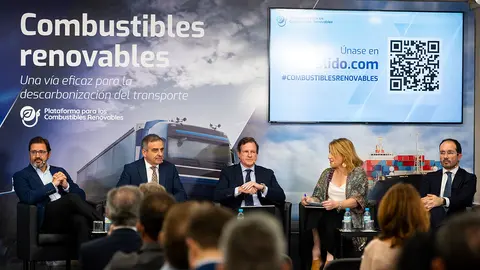Renewable fuels, the perfect complement to electrification to reduce transport's carbon footprint
Madrid Foro Empresarial has held an informative conference at the Pons Foundation entitled "Renewable fuels: an effective way to decarbonise transport"

Electrification is not the only possible alternative for the decarbonisation of transport: renewable fuels are a reality and can be as effective or more effective in reducing the carbon footprint; we just have to bet on them, as a complement to the electric option and even taking advantage of the synergies between the two. This is the main conclusion reached at the conference organised by Madrid Foro Empresarial at the Pons Foundation, which served to present the NTT Data report on the effectiveness of renewable fuels in meeting decarbonisation targets.
The conference was presented by Víctor García Nebreda, coordinator of the Energy and Environment Board of Madrid Foro Empresarial, and secretary general of AEESCAM, and included the participation, in the form of a colloquium, of David Cuesta, director of Business Consulting at NTT Data, and Inés Cardenal, spokesperson for the Platform for Renewable Fuels.
Alternative or complement to electrification
In his presentation, García Nebreda made it clear that "this is not about criticising the electric car; we simply want to make it clear that there are other alternatives to electrification, such as renewable fuels, which can already be implemented with the current infrastructures".

David Cuesta, from NTT Data, explained that fossil fuels (which include biofuels, from biomass and waste, and others of non-biological origin, with CO2 captured from the air), "can be used right now, mixed with current fuels, to reduce the carbon footprint of the transport sector, which in Spain represents 37% of total CO2 emissions, 230 million tonnes in 2021".
According to Cuesta, renewable fuels are the ideal solution for a sector such as heavy transport, whose electrification is very complex due to the enormous weight of the batteries needed to provide vehicles with the same autonomy they enjoy with current fuels.

Moreover, these fuels allow the same fleet to be maintained, do not require investment in charging and dispensing stations, and have an immediate impact.
Raw materials
Regarding the raw materials for obtaining these renewable fuels, the head of NTT Data explained that "Spain is the third country in Europe with the greatest availability of waste (sustainable crops, waste and biogenic CO2) and it is estimated that renewable fuels could replace between 33 and 58% of fossil fuels, depending on the timeframe".
David Cuesta insisted on the idea that "the transport sector is the main target for decarbonisation, because it is the biggest emitter. You can opt for electrification, in combination with renewable fuels, which would be the ideal formula. They are not incompatible solutions: they can be perfectly complementary and generate synergies".
Electrification and renewable fuels
As the report highlights, of the nearly 33 million vehicles on the road in Spain, 99% are powered by combustion engines. A 1% increase in the consumption of renewable fuels would have a massive impact on decarbonisation, equivalent to putting 425,000 electric vehicles into operation, which is 15% more than there were in 2023.
In the words of Inés Cardenal, "the European Union says that the objective is the electrification of the car fleet, but in reality this is an instrument, because the ultimate objective is the decarbonisation of transport. Pushing towards mass electrification does not meet the needs of users, because of the high economic cost involved".

Problems in the implementation of electric vehicles
One of the problems facing electric vehicles is the slow pace of implementation, due to the economic cost. As David Cuesta pointed out, "the electric vehicle has lower ownership costs for the user, but the changeover is not affordable for the average user, who cannot afford to buy an electric vehicle. That's why we have to look for sustainable alternatives with the current vehicle fleet".
A vehicle fleet that is characterised by its age; as Inés Cardenal pointed out, "the most sold vehicle in Spain last year was more than 15 years old".
Taxation penalises renewable fuels
Another of the points highlighted during the conference held at the Pons Foundation was that renewable fuels are penalised by taxation, as the Special Tax on Hydrocarbons and VAT raise the price of these fuels.
"A tax rebate or exemption would be very positive: it could mean a 24% reduction in the cost of vehicle ownership and between 13 and 15% of the cost of a new vehicle purchase", explained David Cuesta.
For her part, Inés Cardenal regretted that "fuels that are 100% renewable are already being marketed, but fiscally they are still treated as if they were fossil fuels, and that is not fair".
Spain, European leader in refineries
Another reason to bet on renewable fuels is the fact that Spain has a total of eight refineries, representing 10% of the total capacity of the European Union, which are becoming multi-energy hubs. By increasing the processing capacity of bio-based fuels, decarbonisation targets can be accelerated at a lower cost to the administration than the commitment to electrification via subsidies.

Furthermore, as Víctor García Nebreda indicated, "this increase in the processing capacity of refineries could become a solution to the problems of empty Spain, because there are large areas with a zero industrial level that have great potential as generators of waste, which is the raw material for these fuels. A first transformation industry could be established in these areas and thus achieve the sustainable development of the rural world".
In this line, Inés Cardenal insisted that "a new value chain can be created for this waste, integrating the agricultural and forestry industry with the renewable fuels industry".









